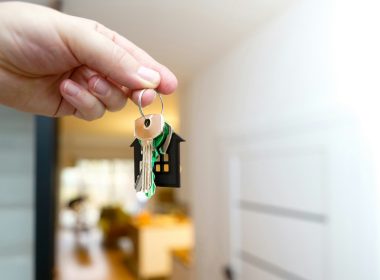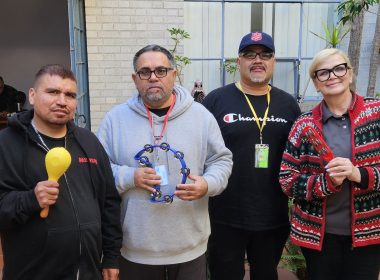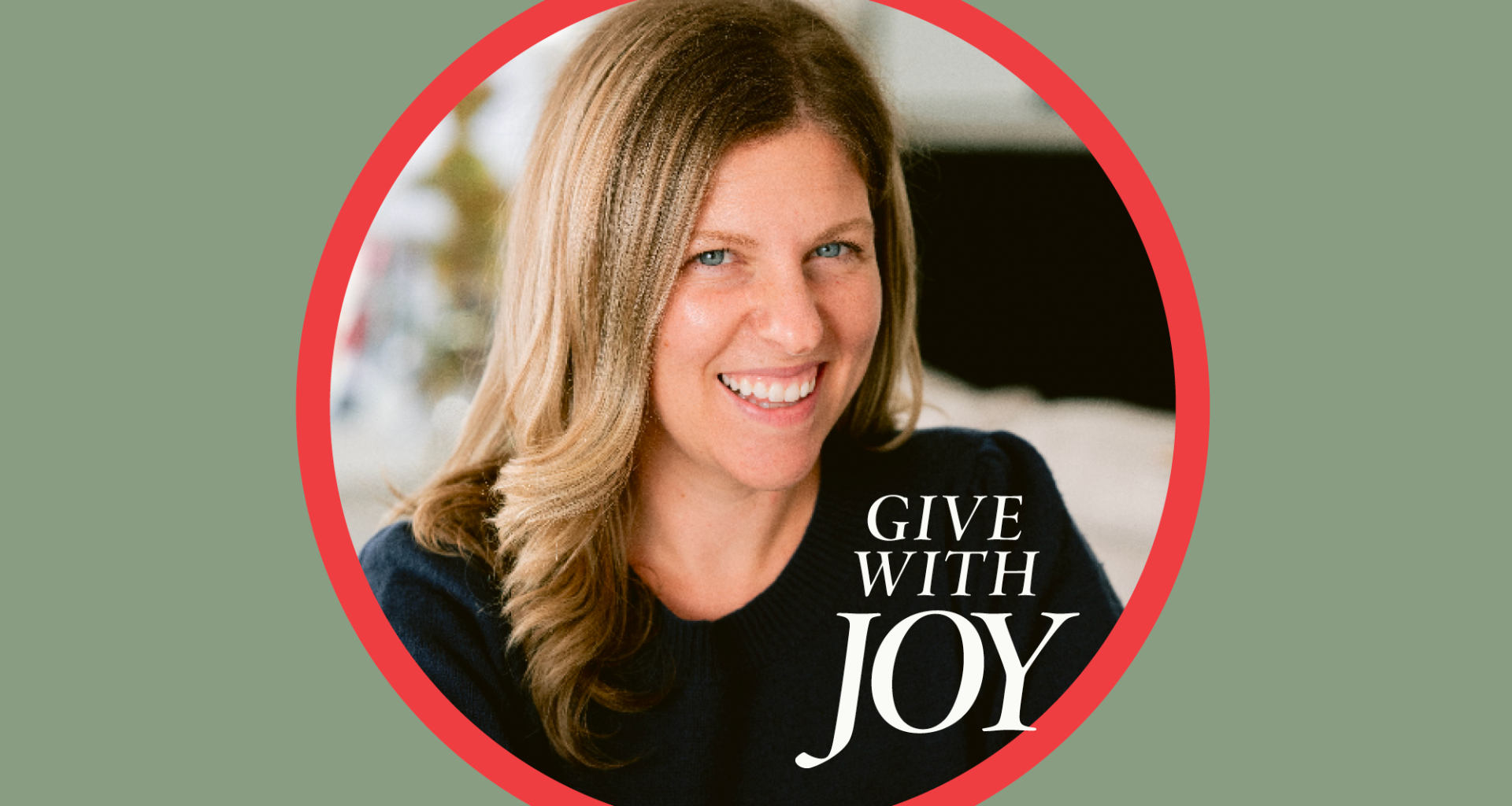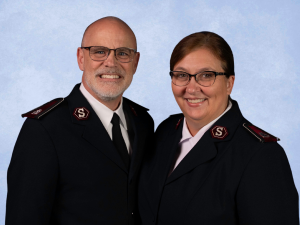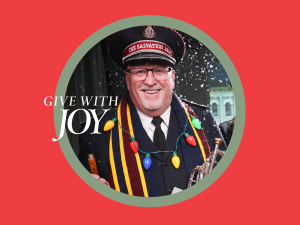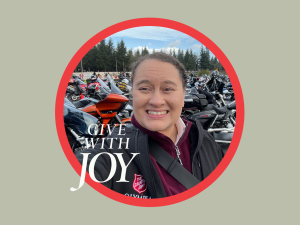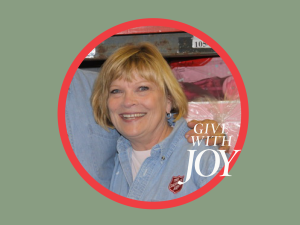At Christmastime, the spirit of generosity shines brightest. But we know giving isn’t just about what we give. It’s about how we give. And that’s why we’re calling this series: Give With Joy.
The Apostle Paul tells us in 2 Corinthians 9:7 that “God loves a cheerful giver.” And we’ve seen that throughout this series—giving changes lives, both for those who receive and for those who give.
But here’s something interesting: science agrees. Research shows that helping others doesn’t just strengthen communities—it also transforms our health. Acts of kindness can boost our resilience, lower stress, and even help us live longer.
Today, I’m joined by health and science journalist Nicole Karlis, author of “Your Brain on Altruism.” In her book, she explores how generosity lights up our brains, improves our well-being, and nurtures a culture of caring.
We’ll talk about why crises often bring out extraordinary generosity, what the latest science says about altruism, and how we can sustain caring for one another even after the crisis passes.
Show highlights include:
- How a yoga teacher’s “prescription” for acts of kindness in India led Nicole Karlis to study the science of altruism and its effects on health.
- The discovery that self-care can also be other-care—and how mindful generosity can ease anxiety and build purpose.
- What research shows about altruism’s power to improve brain and body health—from boosting immunity to reducing stress and loneliness.
- Why disasters like the Napa wildfires often bring out the best in people, and how bounded solidarity connects communities in crisis.
- The neuroscience behind the “helper’s high” and why giving often feels better—and lasts longer—than traditional self-care.
- How group volunteering amplifies the benefits of altruism by creating social connection and shared purpose.
- Why embracing vulnerability and accepting help from others is vital for belonging and resilience.
- Examples of systemic caring, like Open Source Wellness, proving that community itself can be medicine.
- Simple ways to start: offer help, listen deeply, or reach out with kindness—because being of service is a form of self-care.
Listen and subscribe to The Do Gooders Podcast now. Below is a transcript of the episode, edited for readability. For more information on the people and ideas in the episode, see the links at the bottom of this post.
* * *
Nicole Karlis: Altruism is when you give to another person with the intention of improving their well-being. I was first inspired to start studying the health and science benefits of altruism about a decade ago, I went to India for a yoga teacher training. And during that time, one of my yoga teachers took me to his Vedic astrologer and I was having a lot of anxiety at the time, and he said, “He can read your birth chart and maybe give you some advice.”
So I wasn’t expecting anything serious from it. It was just a kind offer from a yoga teacher at the time, and I’m usually not into stuff like this, but I was just being open to experiences at the time, and I said, “I’m really struggling with anxiety. What would you recommend?”
And I thought that he was going to give me some sort of meditation or some sort of yoga pose, and he wrote down a prescription of acts of kindness, to go to a place where someone was hungry and give them food, to give a blanket to someone who needed it.
And that was the first time I started to think about how self-care can be other care. This was also in 2015 when the wellness industry was really ramping up this idea of #selfcare was becoming more mainstream and popular, and a lot of people are turning to alternative health for whatever issues that they have in their life.
And I started to wonder, are there actually is? Is there science behind altruism? Because in that moment when I donated a blanket and I was really mindful about that experience, it did take me out of my head and it did give me, in that moment a sense of purpose. It gave me a moment to connect with another person. And yeah, that really kicked off a 10-year investigation of me interviewing sociologists, psychologists, neuroscientists, and everyone in between.
Christin Thieme: You open your book with the Napa wildfires and what you noticed in people’s response there. Can you share a little bit about that?
Nicole Karlis: Yes. So in addition to, I explained what drew me to the science and health benefits of altruism, I also noticed how people would come together in the wake of a crisis and specifically with the Napa wildfires. So then in 2017, all of Napa, there were these horrible wildfires. I didn’t live in Napa, I lived in San Francisco, and it still affected us.
There were these huge clouds of smoke. People were wearing masks in the city, you couldn’t breathe. And I just saw my community around me, and even if people weren’t directly affected, their homes were being burned down, they wanted to help and so badly. And so that’s when I got interested in, this is an interesting phenomenon that people just instinctively in the wake of a crisis want to help.
And in the book, I talk about this group of teenagers who felt that and they were living in Napa and they wanted to help so they started to, it’s really interesting how instead of staying inside where there’s better air quality, where they could have just been hanging out and playing video games, they went outside as a group. They started just driving around to different evacuation centers and asking, “How can I help?”
And actually, their first offer was declined. I think people were like, “Go home, we’re good here.”
But they went to another evacuation center and someone there said, “Hey, we could really use help transporting clothes to this place,” and so they basically started their own own volunteer run transport service.
And I interviewed these group of teenagers about five years after, and they looked back at that time saying that they felt like such a strong sense of purpose. They felt so strongly connected to their community and it actually, they were able to create, it’s called The Hero Foundation. And now they’re always trying to get teenagers, high schoolers to get involved in their communities. They do diaper drives. They helped when the pandemic happened. So it’s really cool to see how that evolved out of that.
Christin Thieme: You write, “Recollections of the disaster aren’t only defined by loss and tragedy, but by what was gained through both giving and receiving, not just natural disasters, but any crisis that suddenly strikes and snaps people back into the moment to remind them of what matters most.” And I think so many people listening who are part of The Salvation Army will be able to relate to that because we work in so many disaster response scenarios. Is disaster our best example of extraordinary generosity?
Nicole Karlis: I think in some ways it is because I think we’re taught through popular culture that in the wake of a disaster, people can become really selfish. Maybe there’s movie scenes of people fighting over goods in the grocery store. But time and time again, we see that that’s not true. That people come together in very altruistic ways, and there is a sociological term for this, it’s called bounded solidarity. It means that people are bounded by this crisis. They have this unique sense of solidarity with each other.
Now, sociologists have found that more times than not, it fades, but many are curious about why does it fade or how can we sustain that in communities? But I definitely think that amid tragedy, we even think about nine people saw all these beautiful acts of kindness when there was so much suffering. And like I write in the book, we can remember those that as well, in addition to the tragedy in a lot of ways, we almost need to, because we need to have hope in something to hang on to as well, and that’s good for our health. Yeah.
Christin Thieme: Definitely. What does the research about how altruism benefits us, our own brains and bodies?
Nicole Karlis: More broadly, there are numerous health benefits to helping others. Specifically, some things that I found through my research is that altruism can help improve cognitive function and slow cognitive decline. Other research suggests that it can help build immunity and actually slow down disease acceleration. Other research shows that people who volunteer regularly, they live longer and they have fewer hospital visits. And on a day-to-day basis, scientists tell me that it can help reduce loneliness. Well, it can really be the antidote to loneliness. It can help reduce stress and anxiety.
Christin Thieme: How does helping others, how is it more effective or as effective than some of these traditional forms of self-care?
Nicole Karlis: Well, scientists have found that giving to others, it can actually provide more pleasure per the brain’s reward system than doing something that feels good for oneself. They found this by having people give to, donate amid a brain scan versus doing something that, or thinking about something that would feel good to themselves.
They’ve actually even found that donating money can activate a circuit of the brain that scientists know is rich in serotonin and can play a role in social bonding. In a lot of ways, giving to others, it’s actually a more, I call it a more sustainable or more durable sense of pleasure. And I think a lot of people know that also as the helper’s high.
But I also say that it depends what season of giving you are in your life. If you’re really stretched thin, if you’re an unpaid caregiver, giving more isn’t going to be what you need in that moment. But if your own cup is full, I do think that volunteering, doing random acts of kindness can be more satisfying and give you more pleasure than an act of #selfcare. I don’t know what that, maybe a spa day or something.
Christin Thieme: Yeah. As you researched this, was there anything that surprised you in the ways that these acts of kindness can impact our health?
Nicole Karlis: I mean, I think the first thing that surprised me was that scientists were actually studying this and taking this very seriously, because I think that when people think about altruism and acts of kindness, it seems like something that’s fluffy and nice to have.
But I have neuroscientists on the record telling me this is actually a must have for good brain health because when people are chronically stressed, their frontal lobes shut down. And doing something like an act of kindness actually brings that back online. We know that there are a lot of health consequences of living in a very high stress, very high cortisol state.
I think another thing that surprised me is that people are trying in whatever industries or systems they’re in are actually prioritizing caring for others and staying caring for others is a strength and not a weakness. That’s what I talk about in the book, building a culture of caring and systemic caring, that in the book I talk about all of these benefits, but the big takeaway isn’t, okay, so now you need to volunteer and do random acts of kindness X times a week or month.
It really has to be systemic change where we see that caring for others and about everyone in the society and creating a safe space for everyone, that is prioritized in different industries.
I mentioned the California Volunteer Corps and how they’re trying to make volunteering more accessible because what I’ve also found is that volunteering, spending time not being paid for your job, it can be very hard to do for many people, but if there is a way to make volunteering more accessible and more part of our everyday lives, then more people can have access to it and have access to the benefits. Those are a few things that surprise me.
Christin Thieme: You also note that group volunteering is really the gold standard, if you will. Why is community such a powerful aspect of this?
Nicole Karlis: Because it really contributes to that feeling of being safe and having that social connection. It’s the gold standard because let’s say if you have a hobby and you’re in a knitting club and you go every week to go knit together, and that’s really great. But if you’re, for example, really suffering from loneliness, you can still be in that loneliness fog and that loneliness loop and you can be there when you go to your knitting club every week, but are you really connecting and getting what you want out of that?
Now, let’s say if that knitting club is knitting every week to donate blankets to the NICU, you’re maybe then having this stronger sense of purpose that what you’re doing is actually bringing positively impacting your community.
That is the gold standard, to be having social connection with people regularly who are getting to know you in a way that they care for you so it’s not just acquaintances. You’re building those relationships and then collectively you also have a sense of purpose. That’s really powerful.
I think that if you meet anyone who’s been volunteering regularly like that with a group of people, they will tell you that. It’s probably a really important part of their life and has probably had a really positive impact on their health.
Christin Thieme: We’ve heard so much in recent years about the epidemic of loneliness and how much of a problem it is across our society. You talked to a philosophy professor, I believe, who talked about how we organize our lives to death to avoid it, because it requires that we slow down and risk being known by people to spend time with people. So how do we get around that? We’re all busy, we all have a lot going on, of course, but we know that community and community acts of altruism are so good for us. So what’s the workaround?
Nicole Karlis: Yes. Well, that was from, so Cat Moore, she was the director of belonging at USC. And just for people who aren’t familiar with what that means, she was tasked with making sure that students on campus felt more connected to each other because basically there was a survey saying that a lot of students don’t feel like they belong. They’re really lonely, so they brought her on to try to problem-solve that.
And she also has this amazing story where she really suffered from loneliness, and her professor told her what you said, her philosophy professor, that people are scared to really be known. And I think that really speaks to how afraid we are to be vulnerable. And because it can be really scary to be vulnerable, it can be really scary to be in a position to allow people to help you, but that’s how we build deeper relationships with each other, and that’s how we build resilience in our own lives.
I think that’s an important part of the research I found too, and about how this all works, that yes, altruism and being kind to others is good for your health, and you can also be in a season of receiving and you need to be open to receiving the kindness and altruism from others as well. And by doing that, you’re actually giving them the gift of giving to you.
And that can be really hard because I think we live in this society where people are, we have to walk around with this armor on us, and yes, everything’s fine. I don’t need any help. The bootstraps mentality, and that’s really dangerous to our physical and mental health. It’s okay to need each other. It’s okay to be vulnerable, and it’s okay to be in a place to have a friendship or an acquaintance or relationship who can see you for who you are and where you are in that moment.
Christin Thieme: You mentioned having these more sustainable, systemic caring models. Was there anything that inspired you as you researched what those are?
Nicole Karlis: I really liked the work of Open Source Wellness in Oakland, California. They’re trying to make wellness accessible to everyone. And through that people, they can be suffering with anything, and they go to Open Source Wellness and they have access to nutritious food community to counselors for a very accessible cost or their insurance can cover it. And the whole idea is that if some of these people, they might be prescribed medication, but they also need community. I think their slogan is community is medicine.
And specifically, volunteering and altruism is not an explicit part of the program. But what’s interesting is that it became part of it so people would graduate this program and they wanted to started their own mentor program, and they call it the Peer Mentor Program. And so now this was completely created by people who went through this, who maybe went to this program at a very low place of their life, and then when they graduate, they want to mentor other people.
What it told me is that when people feel safe enough, when their basic needs are taken care of, they want to be of service to others as well. And so if we can replicate that in some way, because everyone wants to be kind, everyone wants to be of service to others, I truly, deeply believe that.
But I do feel like we live in a society where that can be really hard for people sometimes. It’s really thinking about how can we have people’s basic needs met so they can experience the benefits and the power of being kind to others.
Christin Thieme: After being immersed in this topic for so long, what’s something that you wish more people knew?
Nicole Karlis: I think just when people are thinking about self-care or they’re really stressed and anxious and they’re like, “I need to,” I don’t know, “go to yoga,” which is great. I love yoga, go to an exercise class. Or they’re really struggling in some part of their lives that they can think that self-care can be other care too. I think it’s important to be thinking about being of service to your community is self-care as well. And just adding that, I say adding that in your self-care toolbox essentially.
Christin Thieme: What small steps then could we take to start that practice of being part of the culture of caring, being part of this others’ care for self-care in our daily lives? What would be your recommendation of where to start?
Nicole Karlis: There are many places to start, and it really, I think, depends on where you are in your life. If you feel like you have the time and space to regularly volunteer, then find something you’re passionate about and get involved and make sure that you’re showing up as much as your schedule and your capacity allows.
But if you can’t do something like that, there’s so many other ways. I say even just making a habit of sending a text to a friend once a week. “Hey, I’m thinking of you,” or saying something really nice. Or if you’re cooking a meal for yourself, do you have enough of the recipe to make double and bring it to a neighbor?
Or let’s say if you’re a mom and you’re going through old clothes that your kids have grown out of, texting a friend with younger kids, “Hey, do you want these clothes? I can drop them off.”
Or even just listening, I say even listening without reacting right away is being a participant in a culture of caring because that is actually the first step to building empathy is to being a good listener. And sometimes people, they just need someone to listen. They don’t need advice, but they just need someone to literally just sit there and listen to them.
*
Clearly, giving doesn’t just help others—it’s good for us too. Altruism lowers stress, builds resilience, and deepens our sense of connection and purpose.
Nicole reminded us that while crises like wildfires or pandemics often spark remarkable generosity, we don’t have to wait for disaster to care for one another. We can choose daily acts of kindness—small or large—that strengthen not only our communities, but our own health and joy.
So here’s my invitation for you this week: try one simple act of giving. Volunteer an hour. Call a lonely neighbor. Buy coffee for a stranger. Pray for someone who needs encouragement. And then notice how it makes you feel.
Because as Scripture says, God loves a cheerful giver. And as science shows, generosity truly does light up our brains and our lives.
Thank you for spending this time with me. To learn more ways to give with joy this season, visit caringmagazine.org/give.
Until next time, may your own acts of kindness bring joy to others—and to you.
Additional resources:
- Join us in giving joy to families who are experiencing poverty, hunger, job loss and more. Your generosity offers joyful reassurance that even during our most challenging times, we are not alone.
- What if five minutes a day could re-center your family on the reason we celebrate? Meet the free Caring Advent Paper Chain—25 days to Read, Reflect and Pray. Refreshed for 2025!
- If you are enjoying this show and want to support it, leave a rating and review wherever you listen to help new listeners hit play for the first time with more confidence.
Listen and subscribe to The Do Gooders Podcast now.



